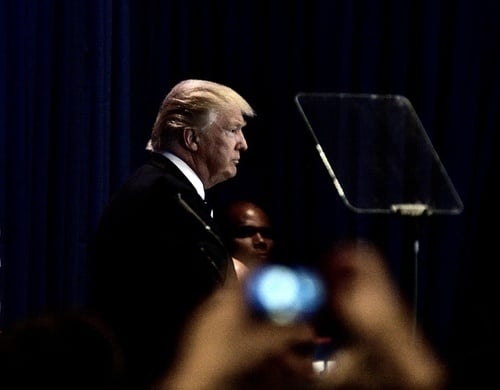

US President Donald Trump promised a lot of things during his historic 2016 campaign. Unfortunately for risk managers, he’s making good on one vow that could thwart global supply-chain operations.
The trappings of a trade war
Economic nationalism and discontent with free-trade agreements knows no borders – even if trade policies sure do. Tariffs are now worth US$400bn worldwide, according to a report by law firm Gowling WLG. Protectionist trade measures have been gaining traction amid a wave of populist movements across the world. Advanced economies in Europe and North America are the primary perpetrators of protectionist trade policies, but countries like India, Russia, Argentina, and Japan have also implemented hundreds of restrictive measures since the financial crisis, says the report.
The latest, most momentous measure was revealed just last week, when Trump announced import tariffs of 25% on steel and 10% on aluminium. There’s fear that the tariffs will raise costs to businesses and consumers, but the real danger to corporations lies in the potential that Trump’s announcement has to spark retaliation from US trading partners and escalate the situation into an all-out global trade war.
“It is clear that we now see a much higher and real risk of triggering an escalation of trade barriers across the globe. Once we start down this path, it will be very difficult to reverse direction,” said Roberto Azevêdo, director-general of the World Trade Organization (WTO). “An eye for an eye will leave us all blind and the world in deep recession.”
But that advice may have come too late. Other countries have already begun firing back. The EU has already said it’s going to raise import duties on peanut and orange juice in retaliation, and China has warned of a “justified and necessary response.”
What’s a trade war mean for risk managers?
“It’s another wake up call,” said Mathew Burrows, director of the Foresight, Strategy, and Risks Initiative at the Atlantic Council. “If companies haven’t been doing [global supply chain] analysis already, some will pay the price.”
The Atlantic Council, in partnership with Zurich, released a study on the risks of protectionism in the globalized world, mapping out a scenario of the longer-term consequences protectionist trade policies. The findings? A “Protectionist victory,” in which tit-for-tat tariff measures snowball, could lead to a loss of US$18trn in global GDP by 2045. “I would say this particular scenario is probably at the extreme end of what you can expect, but nevertheless the kind of implications we saw coming out are probably what you could expect in a milder form,” Burrows said.
The short-term impact of Trump’s announcement is already being felt by businesses. “There’s a huge amount of uncertainty because they allow for exemptions, but other than Canada and Mexico, nobody knows who’s going to be exempted and at what level,” Burrows said. “Companies themselves are trying to figure out what the impact will be, and any uncertainty weighs heavily on markets until things begin to become clear.”
The biggest challenges that trade wars pose to risk managers concern their supply chains. “The longer-term implication is that companies are going to have to think about their global supply chains,” he said. “They’re going to have to ask if there are too many risks involved in it.”
Global retaliation means that things will get worse before they get better. “Other countries aren’t just going to sit back and allow the US to do this, and there could be a lot of collateral damages for US companies and businesses worldwide from the retaliatory measures,” Burrows said. “US companies already are beginning to pull back some of their operations. Part of that is either because US energy is cheaper or because companies have their networks here, but there’s also worry about these protectionist measures.”
Protecting from protectionism
Aside from sourcing domestically, there are a variety of tools risk managers can use to protect their supply chains from harmful trade policies. “The main thing [risk managers] need to be able to do is diversify their sources of production,” said Jamie Brache, deputy managing director of credit and political risk at Zurich. “If you’re getting steel from a country like China, where the tariffs are maybe targeted tariffs, then you’ll want to have more than one source of production, so maybe you’ll want to source more steel from Mexico, which is not subject to the current tariffs.”
Shifting sources is another approach that risk managers can apply to their supply chains. “Sometimes what companies might do is that the steel [they’re supplying] might still be Chinese steel, however it gets shipped via Mexico and get around the tariffs that way,” Brache said. “If you’re manufacturing automobiles in the US, now your price of steel is going to be more, so you might shift some of your production to Mexico, and then ship the finished cars to the US.”
Risk managers may also want to seriously consider investing in emerging technology to lessen their companies’ dependence on global supply chains. “You may want to invest in 3D printing,” Burrows said. “In the future, big trade flows will actually be in information. You can send a program across the world and it can be implemented in printing.”
In a time of intense uncertainty, insurance is a valuable component of a comprehensive supply-chain risk management program. “Since you can’t anticipate everything, or it’s not practical to do all those things, then you buy insurance for when you can’t otherwise mitigate the risk,” Brache said. He cited four types of insurance that risk managers might consider to protect their supply chains from a trade war:
If there’s any good news for risk managers in all of this, said Burrows, it’s that they’re going to have lots of job security.
“In a sense, we’re all losers,” he said.
